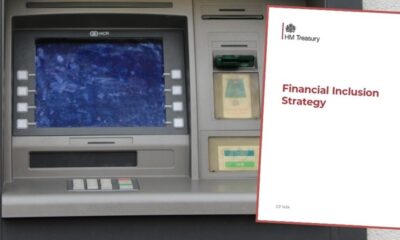Technology
The Future of Fintech: How UK Payment Systems Are Reinventing Banking

Introduction
The United Kingdom has long been at the forefront of financial innovation, and in 2025 it continues to lead the global fintech revolution. London remains a central hub for digital finance, home to startups, regulators, and major institutions shaping the future of payments and banking. The convergence of open banking, central bank digital currencies, and cryptocurrency regulation is redefining the foundations of financial interaction across the country.
The UK’s strategy combines innovation with prudence. Regulators, banks, and technology firms are working collaboratively to build a digital economy that promotes competition while safeguarding trust. This balanced approach has positioned Britain as one of the world’s most advanced financial ecosystems, where technology enhances accessibility, security, and inclusion in unprecedented ways.
Open Banking and the Rise of Financial Connectivity
Open banking, once an experimental concept, has become a cornerstone of the UK’s financial infrastructure. Introduced to increase competition and give consumers control over their data, it has now evolved into a fully integrated network connecting banks, fintech firms, and third-party applications.
Through open banking APIs, customers can manage multiple accounts, access real-time insights, and automate financial decisions from a single platform. This connectivity has encouraged innovation in budgeting tools, credit assessment, and personalised finance management. Small businesses benefit from faster lending approvals, while consumers enjoy seamless payments and enhanced transparency.
The next stage of open banking is already taking shape: open finance. This expansion allows customers to connect investment accounts, insurance policies, and pensions into the same ecosystem. As financial data becomes more interoperable, the boundaries between traditional banking and fintech are dissolving. Collaboration between legacy banks and digital startups has created a system that is faster, smarter, and more responsive to user needs.
Open banking’s success has also inspired global adoption, with other countries looking to the UK as a model for digital financial regulation. The Financial Conduct Authority (FCA) continues to refine standards ensuring that innovation is matched by strong data protection and consumer rights.
Central Bank Digital Currencies and the Digital Pound
The Bank of England’s exploration of a central bank digital currency (CBDC) has become one of the most significant developments in modern finance. The proposed “digital pound” aims to combine the stability of traditional money with the efficiency of digital payment systems. Unlike cryptocurrencies, which operate on decentralised networks, a CBDC would be issued and regulated by the central bank, ensuring trust and security.
Pilot programs launched in partnership with major UK banks and fintech companies are already testing how the digital pound could function in everyday transactions. The system would allow consumers and businesses to make instant payments without intermediaries, reducing costs and improving transaction speed. Retailers and service providers are preparing to integrate CBDC payments into their platforms, viewing the technology as a natural evolution of digital banking.
For policymakers, the challenge lies in ensuring that the introduction of a digital pound complements, rather than disrupts, the existing financial system. The Bank of England is working closely with the Treasury to evaluate privacy concerns, cybersecurity standards, and financial inclusion goals. Early findings suggest that a CBDC could expand access to banking for underserved communities while reinforcing the UK’s position as a leader in secure digital finance.
The potential international impact is equally significant. A British CBDC could facilitate faster cross-border transactions, reduce currency exchange costs, and strengthen the pound’s role in global trade. As nations race to modernise their payment systems, the UK’s cautious yet forward-thinking approach is being closely watched by policymakers around the world.
Crypto Regulation and the Path to Stability
Cryptocurrency remains one of the most dynamic yet controversial areas in fintech. The UK government has sought to strike a balance between fostering innovation and protecting consumers. Recent regulatory updates introduced clear frameworks for exchanges, stablecoins, and digital asset custody, providing legal certainty to investors and businesses.
This new clarity has encouraged mainstream financial institutions to explore blockchain applications. Several major banks are experimenting with tokenised assets, blockchain-based settlements, and digital identity solutions. Meanwhile, fintech startups are leveraging blockchain technology to enhance transparency, improve compliance, and streamline transactions.
Stablecoins, digital assets pegged to fiat currencies, are being integrated into payment systems, bridging the gap between decentralised innovation and regulated finance. Under new FCA guidelines, these coins must meet strict reserve and auditing requirements to ensure reliability. This hybrid model allows digital assets to coexist with traditional systems, fostering a regulated yet open marketplace.
Despite progress, regulators remain cautious. The collapse of unregulated crypto ventures in recent years highlighted the need for consistent oversight. The UK’s pragmatic stance prioritises financial stability while allowing room for experimentation. This approach has positioned London as a preferred base for crypto firms seeking credibility and compliance.
The broader goal is synergy between crypto, CBDCs, and open banking. Together, these technologies could create a seamless, interoperable financial environment where digital assets, government-backed currencies, and traditional banking coexist within one secure framework.
Innovation, Inclusion, and Global Leadership
The UK’s fintech revolution is not solely about technology, it is about accessibility and fairness. Digital transformation is helping extend financial services to communities once excluded from traditional banking. Through smartphone-based platforms, even microbusinesses and low-income households can now access credit, insurance, and savings products.
The government’s focus on inclusion is reflected in initiatives such as the Digital Finance Strategy, which promotes literacy, infrastructure development, and affordable access. Public-private partnerships are working to ensure that innovation benefits society broadly, not just the financial elite.
Globally, London remains the benchmark for fintech governance. The city’s regulatory expertise and openness to experimentation have made it a magnet for international talent and investment. As other financial centres attempt to catch up, the UK continues to refine a model that balances innovation with stability, freedom with responsibility.
Conclusion
The future of UK fintech is being built at the intersection of innovation and integrity. Open banking, central bank digital currencies, and crypto regulation are not separate revolutions but interconnected forces shaping a unified financial ecosystem. Together, they represent a vision of a modern economy that is inclusive, efficient, and secure.
London’s leadership in digital finance reflects more than economic ambition, it reflects trust, adaptability, and global vision. As technology continues to redefine how money moves, the UK stands ready to lead the next chapter in financial evolution, proving that innovation guided by responsibility can reinvent banking for the digital age.






















